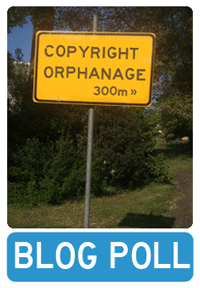 “The results are just about as astonishing as the number of people who participated.”
“The results are just about as astonishing as the number of people who participated.”
In our first Kluwer Blog Poll, we asked for your reaction to the two following statements regarding the implementation of Directive 2012/28/EC on certain permitted uses of orphan works:
1) whether the Directive would significantly facilitate the mass-digitization efforts of cultural heritage institutions in daily practice; and
2) whether a system of extended collective licensing would provide the most workable solution to the problems of mass-digitization.
The results are just about as astonishing as the number of people who participated in this first edition of the poll: 2076 readers cast their reaction on the blog, 96% of whom fully agreed with both statements!
With respect to the first statement, instead of an overwhelming ‘Fully Agree’ I had expected a massive ‘Fully Disagree’, convinced as I am that a Directive on Orphan Works that requires the conduct of a diligent search for every work contained in a cultural heritage institutions’ collection will not ‘significantly facilitate the mass-digitization efforts’ on a daily basis.
I was until now under the impression that Directive contains too many uncertain elements that need to be put in practice, to reassure cultural heritage on the extent of their obligations. Among those are the obligations of record keeping; the obligation to look for information in another country than that of first publication, where there is reason to believe that relevant information could exist in that country; the unspecified procedure allowing rights owners to put an end to the orphan status of a work; the level of damages owed for past uses of a ‘once’ orphaned work; the as yet non-existing or undefined national authority to which information on the searches and the results must be communicated; and the as yet undefined role of the Office for the Harmonization in the Internal Market (OHIM) as the European entity in charge maintaining accessible and accurate information for the general consultation on the rights status of works held by cultural heritage institutions across Europe. These are all elements that do not contribute to a positive change of the current situation, or am I wrong?
Regarding the second statement, I did not anticipate such a high level of acceptance among our readers for the extended collective licensing (ECL) system as a solution for mass-digitization of copyright protected works. Let us recall that ECL was altogether rejected by the European Commission in its Impact Assessment on the cross-border online access to orphan works, as a solution to allow cross-border online access (p. 17). The first reason put forward by the Commission was that when an ECL system is in place, there is no need for an institution to carry out a diligent search prior to making the work available to the public. The cultural heritage institution is committed to trying to identify and locate the rights owners, but the making available of the work not hampered by its failure to succeed. Of course, should the rights owner reappear, she is entitled to her portion of the fees collected and she may put an end to the orphan status of the work. The second reason put forward by the Commission to reject ECL relates to the presumed incapacity of this system to function on a cross-border basis. On this point, however, the Impact Assessment report was as succinct as it was unsatisfactory (p. 27): not a word or thought on how different national systems could be made to work together on a trans-frontier basis.
Which leads us with your overwhelming expression of support in favour of ECL! The UK has already acted in this sense; Germany has followed the ECL route for out-of-commerce works; which Member State will be next?
_____________________________
To make sure you do not miss out on regular updates from the Kluwer Copyright Blog, please subscribe here.
Kluwer IP Law
The 2022 Future Ready Lawyer survey showed that 79% of lawyers think that the importance of legal technology will increase for next year. With Kluwer IP Law you can navigate the increasingly global practice of IP law with specialized, local and cross-border information and tools from every preferred location. Are you, as an IP professional, ready for the future?
Learn how Kluwer IP Law can support you.



I am gobsmacked by the results. Expected pretty much the opposite. We at Wikimedia are still weary of digitalising and publishing orphan works. Seems too risky.
lolz the result was awesome…
Qassim University